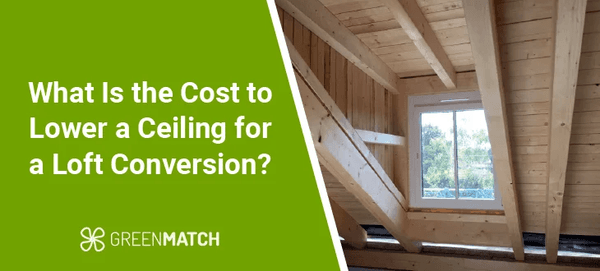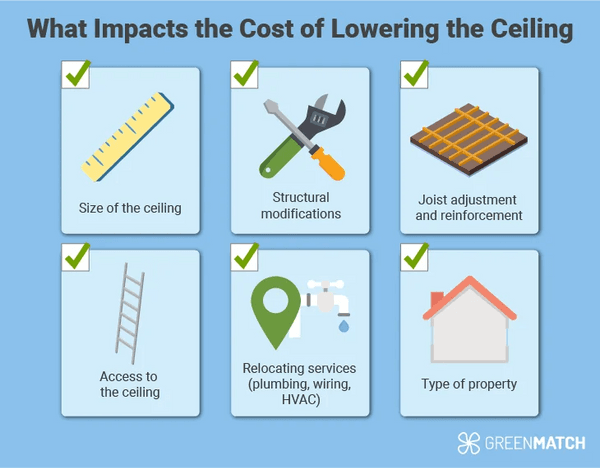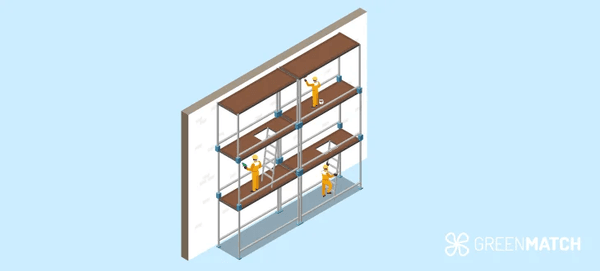Answer these simple questions and we will find you the BEST prices
Which type of solar quotes do you need?
It only takes 30 seconds
100% free with no obligation

Get Free quotes from loft conversion specialists near you

Save money by comparing quotes and choosing the most competitive offer

The service is 100% free and with no obligation
- GreenMatch
- Loft Conversion
- Minimum Height
- Lowering Ceilings for a Loft Conversion
- Lowering Ceiling Cost
What Is the Cost to Lower a Ceiling for a Loft Conversion?


- The average cost to lower a ceiling for a loft conversion in the UK typically ranges from £500 to £1,000 per m2.
- For a standard project, you should budget between £20,000 and £40,000 for the entire process.
- Lowering a ceiling can take anywhere from 2 to 6 weeks.
One of the biggest challenges for homeowners planning a loft conversion is understanding the costs involved, especially when it comes to lowering the ceiling. Many don’t know how much this crucial step will impact their budget or if it’s even worth the investment.
Lowering a ceiling can significantly enhance your loft space, but without a clear idea of the costs and benefits, it can feel like a daunting decision.
This guide will break down the specific costs and factors involved, helping you determine whether lowering the ceiling is the right choice for your loft conversion.
Save time and start your ceiling-lowering project faster with our 30-second form — get up to three free, no-obligation quotes from trusted local installers.
Click below to begin!
- Describe your needs
- Get free quotes
- Choose the best offer
It only takes 30 seconds



Lowering ceiling for a loft conversion cost
The average cost of lowering the ceiling for loft conversion in the UK typically ranges from £500 to £1,000 per m2, depending on the complexity of the work. For a standard project, you should budget between £20,000 and £40,000 for the entire process, including labour and materials.
The key factors that affect the final cost include the size of the ceiling, structural modifications, joist adjustments, access to the area, relocating services, and the type of your property.
Here is the average cost based on the size of your ceiling:
| Ceiling size | Cost per m² |
|---|---|
| Small (up to 20m²) | £500–£700 per m² |
| Medium (20–40m²) | £700–£900 per m² |
| Large (over 40m²) | £900–£1,000 per m² |
This could include salvaging wooden beams, joists, and ceiling panels. By doing so, you reduce construction waste and minimise the demand for new materials. This helps lower the carbon footprint associated with manufacturing, transportation, and disposal.
After knowing the average cost of loft conversion, it's crucial to get multiple quotes from local loft conversion specialists to ensure you’re getting the best price, compare services, and avoid hidden fees.
It also helps you assess the experience and reliability of each contractor, making sure you choose someone who fits your budget and project needs.
Sick of spending hours searching for quotes? Save time and jumpstart your loft conversion project with our quick 30-second form — get up to three free, no-obligation quotes from reliable local installers.
Click below to begin!
- Describe your needs
- Get free quotes
- Choose the best offer
It only takes 30 seconds



Key factors that affect the cost to lower ceiling for loft conversion

Several factors play a role in determining how much you'll need to budget for the project. Understanding them will help you anticipate costs and make informed decisions.
Size of the ceiling
The size of the area where the ceiling needs to be lowered has a direct impact on the cost. The larger the space, the more materials and labour will be required.
For a small ceiling (up to 20m²), expect to pay between £500 and £700 per m². For larger ceilings, the cost increases to £900 to £1,000 per m².
Structural modifications
Lowering a ceiling involves significant structural work, such as adjusting the joists and potentially reinforcing parts of the building. A structural engineer will need to assess the property to ensure the building’s integrity is maintained and that all modifications comply with building regulations for loft conversion.
Structural assessments typically cost between £500 and £1,000, with more complex adjustments adding to the overall cost.
Joist adjustment and reinforcement
The process of lowering a ceiling requires adjusting and possibly reinforcing the existing joists to create a new floor level. This is a labour-intensive task, as the existing structure must be safely modified without compromising stability.
Joist adjustments typically account for a large portion of the budget, adding £2,000 to £4,000 depending on the complexity of the work.
Access to the ceiling

Limited access to the ceiling area can increase labour costs. If your property has tight spaces or poor accessibility to the loft area, contractors may need to take extra measures, such as scaffolding, which adds to the price.
Scaffolding alone can cost between £2,000 and £3,200, depending on the height and difficulty of access.
Relocating services (plumbing, wiring, HVAC)
In many cases, lowering a ceiling requires the relocation of existing services such as plumbing pipes, electrical wiring, and HVAC systems. This additional work can increase both the duration and the cost of the project.
Relocating services can add anywhere from £1,000 to £5,000, depending on the extent of the work required.
Type of property
The type of property you have, whether it’s a detached, semi-detached, or terraced house, can also affect the cost. Older properties may require more work due to outdated structures, while newer homes might have fewer obstacles.
Expect higher costs in older properties due to structural complexities, with prices potentially increasing by 10-20%.
It’s essential to get quotes from local specialists to get an accurate estimate. Comparing quotes from multiple contractors ensures you get the best price for your specific needs and budget.
Save time and kick-start your ceiling-lowering project by filling out our 30-second form — receive up to three free, no-obligation quotes from trusted local installers.
Click below to begin!
- Describe your needs
- Get free quotes
- Choose the best offer
It only takes 30 seconds



FAQ
The cost typically ranges from £10,000 to £20,000 per project, or £500 to £1,000 per m², depending on the project’s complexity.
Lowering a ceiling can take anywhere from 2 to 6 weeks, depending on factors such as the ceiling size, structural changes, and the need for electrical or HVAC modifications.

Tania is an experienced writer who is passionate about addressing environmental issues through her work. Her writing aims to shed light on critical environmental challenges and advocate for sustainable solutions.
We strive to connect our customers with the right product and supplier. Would you like to be part of GreenMatch?

